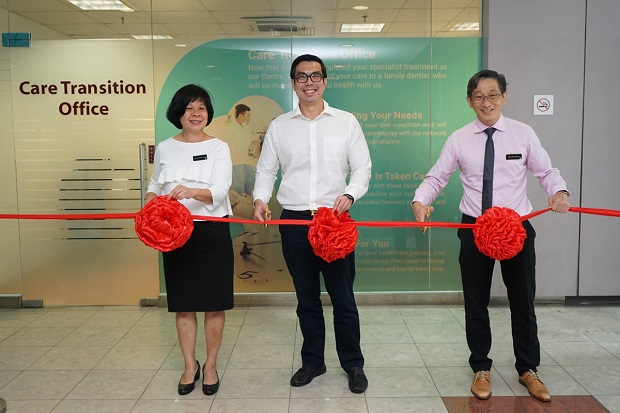By 2030, one in four
Singaporeans will be
over 65 years of age,
according to data
from the Ministry of Health
(MOH). With a booming ageing
population due to increased
life expectancy, there is rising
demand for care for chronic
dental conditions.
“Robust primary dental care
support is important to ensure a
strong and sustainable network
where patients have easy access
to affordable treatment across
different healthcare settings.
With an ageing population,
close partnerships with primary care providers are more vital
than ever,” said Dr Wu Siwen,
Consultant, Department of
Restorative Dentistry, and Head,
Community Partnerships, National
Dental Centre Singapore (NDCS).
Resource allocation
NDCS’ Care Partnership
Programme (CaPP) was
launched as a collaborative
partnership with community
dentists to support the
co-management and
right-siting of dental cases.
Under this programme, NDCS
patients with stable and low-risk
dental conditions will have their
care transited to General Dental
Practitioners (GDPs) located
within their community. These
conditions include selected gum
and root canal treatments, single
crowns, and dentures.
This allows patients to seek
treatment at GDPs conveniently,
with assurance that a specialist
has assessed their condition as
stable. Specialist resources at
NDCS can then focus on managing
complex dental conditions.
Optimal care is thus ensured for
every patient, explained Dr Wu.
Patients who are at higher
risk of disease deterioration will
continue to receive care from
both NDCS and community care
partners under CaPP’s Shared Care
model. This includes patients who
suffer from medical conditions
and have other risk factors,
such as diabetes and smoking
respectively, which may cause
them to be more susceptible to
certain gum diseases.
Following visits with GDPs,
these patients may be required
to do follow-up consultations
with NDCS specialists six
months later to ensure careful
assessment of recovery.
CaPP reflects MOH’s
vision of extending care of
patients beyond the hospital to
the community.
“As a national specialty centre,
NDCS has to keep abreast of the
changing needs of the population
so that we can effectively serve
our patients. Through this
programme, we work closely with
our community care partners
and tap on available resources to
ensure a continuum of care for our
patients,” said Dr Wu.

<<Clinical Associate Professor Poon Choy Yoke, Director, NDCS; Dr Chng Chai Kiat, Chief Dental Officer, Ministry of Health; Clinical Associate Professor Teoh Khim Hean, Deputy Director (Clinical and Regional Health), NDCS, at the opening of the Care Transition Office at NDCS.>>
Benefits of right-siting
Patients can choose to visit
their preferred dentist, or have
NDCS match them with a dental
partner located in their community.
There are multiple benefits
in anchoring patients in their
community. Keeping costs
affordable is one tangible benefit,
as treatment fees at participating
GDP clinics are capped at a
maximum amount for basic and
intermediate dental care.
The convenience of receiving
treatment closer to home is also
important. “Patients have greater
flexibility to visit their dentists after
work and on weekends, without
the hassle of travelling. Receiving
long-term care for chronic dental conditions from a dedicated GDP
also ensures that patients are well
taken care of by a professional
most familiar with their dental
and medical history. A close-knit
dentist-patient relationship can be
established,” Dr Wu said.
Implementing this shift to
community dental care is not
without its challenges. “Some
patients feel that all their dental
needs should be addressed at
NDCS and are unsure of the
quality of care they would receive
at GDP clinics,” explained Dr Wu.
To address this, NDCS has
been educating patients,
facilitating smooth transitions
through assisting with dental
appointments, and working to
build patients’ trust in GDPs.
It is also working closely with
GDPs to effectively transit the
care of patients. A framework
has been developed to evaluate
the care delivered and to
monitor patient outcomes.
Dentists are also required to
complete a series of workshops
and lectures to upgrade their
skills and align themselves with
NDCS’ mission of championing
joint care for patients.
 Future of dental care
Future of dental care
Since CaPP was launched in 2017,
NDCS has successfully rightsited
more than 600 patients to
dentists within the community.
The majority of patient feedback
has been positive.
“Patients have found that the
community dentists provide good
services and are able to provide
detailed explanations of their
conditions. Their clinics are also
closer to home, and hence more
convenient,” Dr Wu said.
GDPs involved have also
responded positively to the
collaboration. “CaPP has allowed
me to actively contribute to this
national effort of improving dental
care,” said Dr Hong Qixian, a GDP.
“Continual education by the
specialist-led programme has
also helped me align my skills to
the expected standard of a public
healthcare institution. I hope to see
more cross-referral integrations in
the future,” he added.
Such plans are already in the
pipeline. NDCS intends to expand
the programme to engage more
dental partners and include other
procedures, such as advanced root
canal treatments.
“We hope to grow the current
pool of 36 dental partners to
60 by 2022. Once the pool of
dental partners is sizeable, they
can even set up their own primary
care network, which will enable a
more seamless collaboration with
NDCS,” said Dr Wu.
“Dental care is a responsibility
that needs to be shared by every
healthcare worker. We need to
ensure that patients get the
right care from the most suitable
providers in the right setting and
at the right time,” she said.
